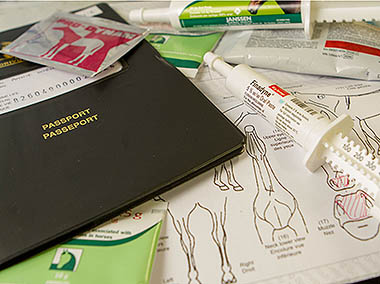UK To Introduce Central Equine Database After Endorsement Of Tougher EU Laws In Wake Of Horse Meat Scandal
 10 years ago
10 years ago  1990 views
1990 views
Posted
15th September, 2014 22h07
 Passport image - credit World Horse Welfare
The UK is to establish a much needed new central equine database as part of a more robust - and enforceable - equine identification (horse passport) system after EU member states endorsed proposals for stronger regulations after flaws were laid bare in last year’s horse meat scandal.
Equine Sector Council Chair Jeanette Allen said:
“The Equine Sector Council welcomes these proposals which will be a big step forward for horse welfare in the UK and Europe. The new regulations are a triumph for Britain’s horse sector and Defra who have worked closely and collaboratively together to ensure a better system for equine identification. More robust standards of documentation and a central database in every European country will help to reduce fraud and improve traceability, owner accountability and disease control planning across the European Union – so helping to protect the valuable horse sector.”
World Horse Welfare Chief Executive Roly Owers said:
“Horses in the UK will especially benefit from these tougher laws as the UK’s system of equine identification could arguably be said to be one of the most complex, and abused, systems in Europe. One of the key horse welfare challenges we have is linking a horse to an owner and an overall lack of compliance and enforcement. With more than 75 passport issuing organisations of varying standards and no central database, finding a horse’s owner and enforcing the regulations was effectively impossible. We have always been clear that a central database is a fundamental element in building a system that is more workable and enforceable, which can better protect our horses. Now we need to make sure the revised UK Regulation maximises compliance, something that has been shockingly low up in many areas until now.”
Jeanette continued: “The new regulations will help, but they alone will not solve the problem. A law is only effective if it is enforced, and this is especially true for identification. We will now focus on working with Defra so that they create a central database that is fit for purpose, introduce batch-controlled retrospective microchipping of all horses and ponies and fixed penalties for non-compliance. Government must also support better enforcement which has been a low priority. We look forward to discussing all of these issues with Defra and continuing to work with them on a brighter future for horses in the UK.”
Passport image - credit World Horse Welfare
The UK is to establish a much needed new central equine database as part of a more robust - and enforceable - equine identification (horse passport) system after EU member states endorsed proposals for stronger regulations after flaws were laid bare in last year’s horse meat scandal.
Equine Sector Council Chair Jeanette Allen said:
“The Equine Sector Council welcomes these proposals which will be a big step forward for horse welfare in the UK and Europe. The new regulations are a triumph for Britain’s horse sector and Defra who have worked closely and collaboratively together to ensure a better system for equine identification. More robust standards of documentation and a central database in every European country will help to reduce fraud and improve traceability, owner accountability and disease control planning across the European Union – so helping to protect the valuable horse sector.”
World Horse Welfare Chief Executive Roly Owers said:
“Horses in the UK will especially benefit from these tougher laws as the UK’s system of equine identification could arguably be said to be one of the most complex, and abused, systems in Europe. One of the key horse welfare challenges we have is linking a horse to an owner and an overall lack of compliance and enforcement. With more than 75 passport issuing organisations of varying standards and no central database, finding a horse’s owner and enforcing the regulations was effectively impossible. We have always been clear that a central database is a fundamental element in building a system that is more workable and enforceable, which can better protect our horses. Now we need to make sure the revised UK Regulation maximises compliance, something that has been shockingly low up in many areas until now.”
Jeanette continued: “The new regulations will help, but they alone will not solve the problem. A law is only effective if it is enforced, and this is especially true for identification. We will now focus on working with Defra so that they create a central database that is fit for purpose, introduce batch-controlled retrospective microchipping of all horses and ponies and fixed penalties for non-compliance. Government must also support better enforcement which has been a low priority. We look forward to discussing all of these issues with Defra and continuing to work with them on a brighter future for horses in the UK.”More from
- IVC Evidensia assembles expert team to run new £10m referral hospital
- Home delivery service can increase pet health plan sign-ups by 25%
- Research reveals vital clues to help fight anthelmintic resistance
- Lifetime Achievement Award recognises Harrogate vet’s dedication to improving the health and welfare of rabbits
- Bake sale at Leicestershire vet practice for good cause

